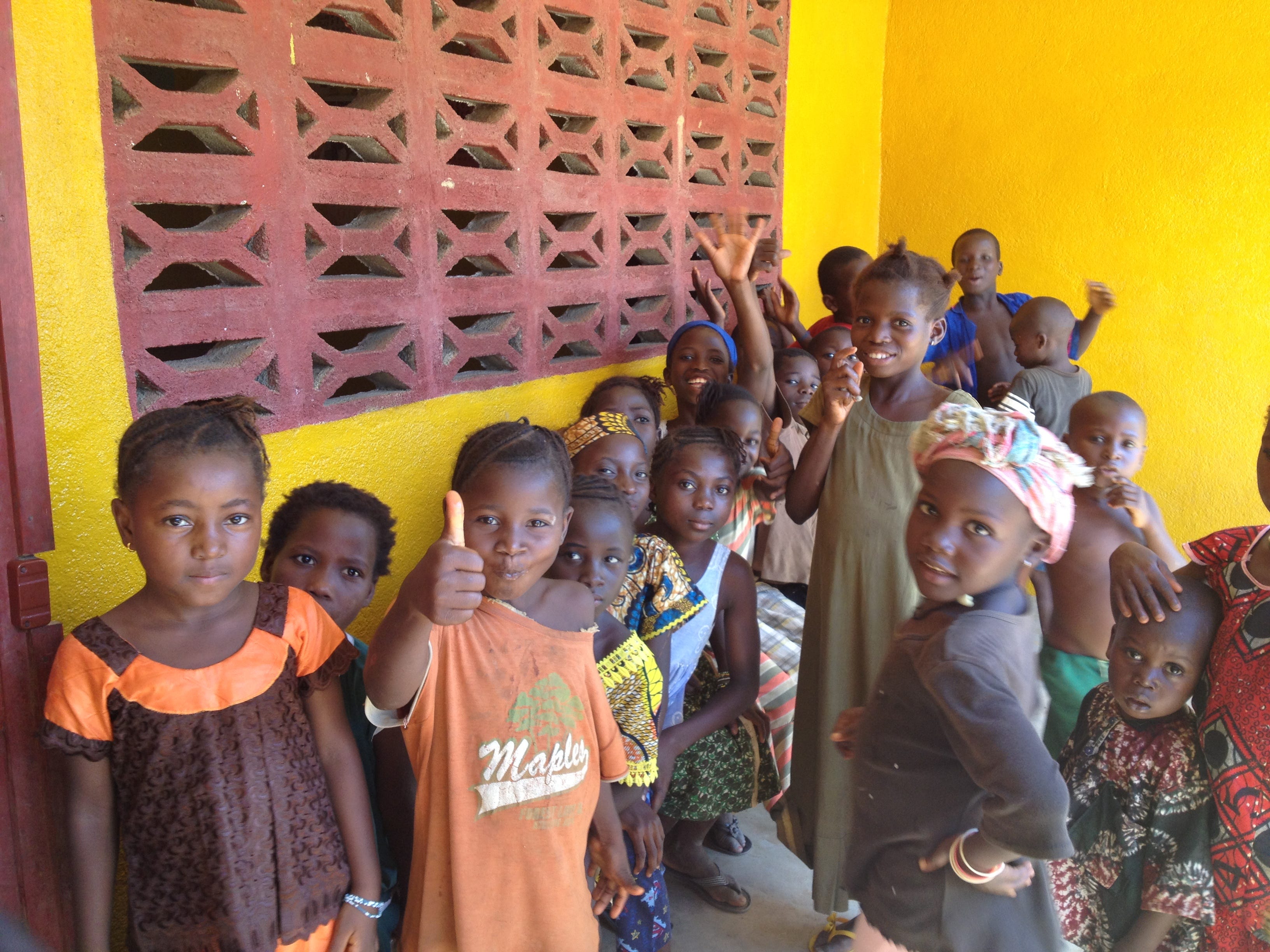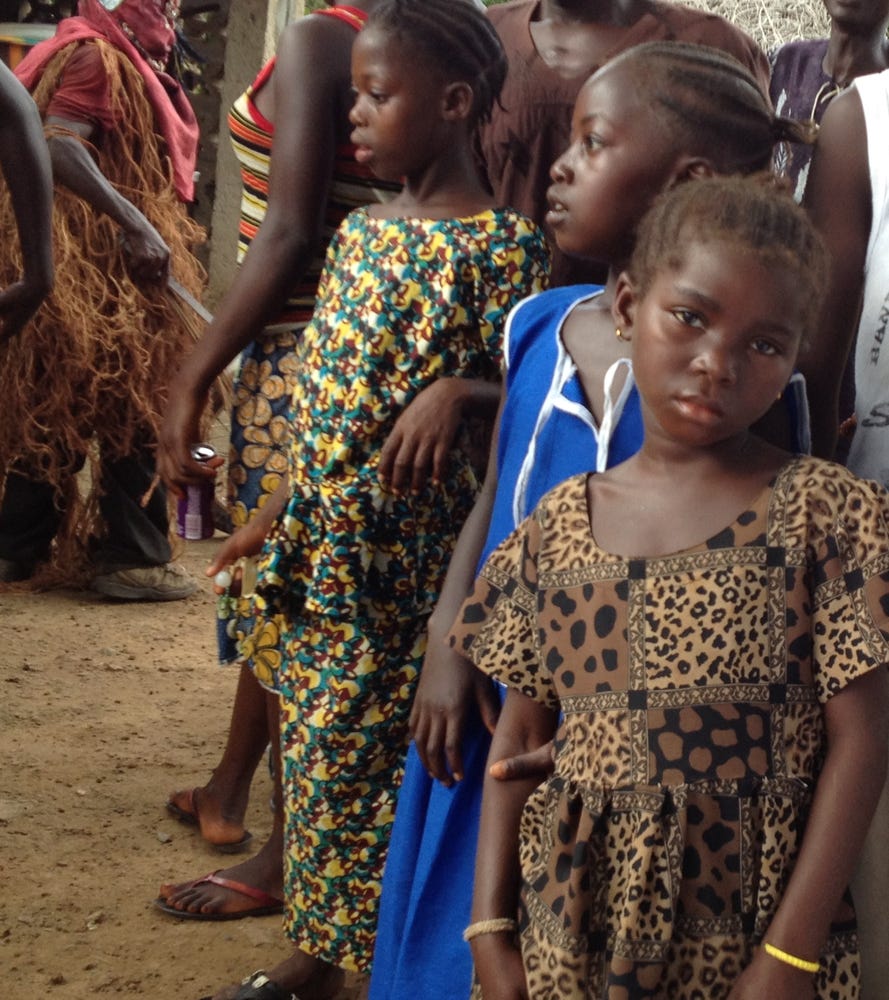"My humanity is bound up in yours, for we can only be human together."
— Desmond Tutu, human rights activist & Nobel Peace Prize winner
The days are closing in again. Compressing. Mornings are muffled in fog, redwoods muted and drippy, migrant birds tacitly preparing to leave. I’ve been waking in a darker hour to a distant ululation that stops when I sit up. A dream memory. Quiet, except for the trickle of a stream thinned by drought. My first thought, something always goes on.
For weeks, I’ve followed the stories about Ebola, seen the images, the faces of Sierra Leone and Liberia. I was there less than a year ago, September, tail end of the rainy season. Let me tell you: The two children, teenagers now, whom I sponsor there, Alie and Thaimo, and their families, their roaming goats and petite chickens, are real.
Cursing the reporters who name only countries and not villages, towns, or regions—as if America could be the same, Yonkers to Missoula—I scour the Web to see where the virus has taken hold.
I see Kailahun District and its major town Kenema, where I stayed in a guest house my first night in Sierra Leone. Almost alone (I was visited by a dazzling green beetle), I sampled my first cassava, potato-like, in a starkly simple room whose walls amplified voices speaking Krio (reminiscent of our Creole) and Mende (a tribal language).
We arrived in the dark—Osman and Fataba (my Sierra Leone colleagues) and me—a true dark, lit only by cooking fires then generators as we approached the outskirts of Kenema. The meal of cassava and chicken was a gift from Fataba’s mother, welcoming me after driving from Liberia, away from the honking motor-bikes and human throngs of Monrovia, bumping along for hours on red-mud, rutted passageways (you can’t really call them roads) cut through rainforest.
Yesterday, clicking through web pages, I read that Ebola has reached Freetown, the last stop on my trip, and now a last stop for Saudatu Koroma. Saudatu is the first person in Freetown to succumb to Ebola. She was only 32 and was training to be a hairdresser. She would have had a promising career and future. Hair, as I discovered, especially elaborate braiding, or plaiting as it’s called there, and trendy, often flamboyant, wigs are important to most women, even the poorest, in West Africa.
Saudatu’s parents stole her away from the hospital where she was being treated, presumably out of fear of “the people dressed as devils,” the story says. She collapsed on the floor of the local healer’s home. The healer’s own power against Ebola, what saved him, was his good fortune in not being at home when Saudatu arrived. I’m guessing he may not return again for a while, as 4 days passed before anyone thought to give him a little bleach and instructions on Ebola prevention.
My final nights in Sierra Leone were spent at Freetown’s Family Kingdom Hotel. Not a hotel by American standards, it was a funky, has-been sort of place. Its security-guarded grounds included a giant, decades-old, plastic statue of King Kong gripping a peeling Ann Darrow. A pet duiker, a small speckled antelope with the personality of a golden retriever, visited me each morning for a scratch between her horns .
Three nights in a row I tossed, sticky, under a bed net. The thick air pressed into me the way thousands of people, flooding the city’s unlit streets, pressed into our 4 x 4 land rover as Osman, reaching over to lock my door, inched us toward the hotel my first night. Women and children tapped on my window with a wave or a scowl, and a few ambitious guys yelled, “Hello, white girl, would you like a boyfriend?”
Waiting for sleep my final night, I listened to Aljazeera in the next room reporting on a shooting at a mall in Nairobi, and in another room, the melodrama of a Nigerian soap opera, “No, woman, you cannot have my husband!” By 3 a.m., it was quiet enough to marvel at the Atlantic lapping sand and trash, sadly so much trash, across the street on a western coast, blissfully disorienting. At the same time, I was ready to return to my own craggy Pacific home, feeling, honestly, grateful that home was somewhere else.
Now I wonder, was Saudatu Koroma in any of those crowds we inched through, did our eyes meet for a passing moment? I’ll never know. We were there together in that sprawling city of Freetown, though locked in the trajectories of our separate lives.
Clicking through webpage after webpage, I see the names of other places I’ve been. There’s Bo. Just out of that town, I ate boiled groundnuts—small, soggy peanuts—from a woman in a yellow-and-magenta-print dress with rivulets of sweat flowing along her temples and a toddler tied to her hip, along one of the few actual roads in the country. Further north and west, is Bombali, which I consider ‘my district,’ because Thaimo and Alie live there. The CDC map shows a blot of reddish-orange, color of dried blood, it occurs to me, for Bombali. Ebola lives there too now, if you decide a virus is a life form.
So lately I’ve been waking to this memory of the guest house in Makeni, largest town in Bombali District and third largest in Sierra Leone. There’s ululation and chanting, neighborhood women offering Islamic prayers, words a long, monotone exhalation with simultaneous breaks to inhale, some ecstatic trilling, and more droning. I’m looking out my second floor window to a muddy, littered courtyard between my building and two others.
My view of the women and girls, I’m sure I hear young voices and older, is obscured by the thatched roof over their open room. My window is crooked, cracked, and doesn’t close, so it’s easy to listen to them, caught in the music of their devotions, accompanied by the occasional the bleating of a goat that wanders in and out of the scene.
One morning in dim dawn light, I see a little boy, maybe 3 years old, wobble out of another building into the courtyard, bottomless. He stands at the edge of a puddle from the prior night’s rain, reaches down with one hand, and begins to pee into the puddle, when a chicken jutting by captures his imagination. He toddles toward the chicken, trying to spray it, but the chicken is too fast and the stream too quickly spent. All the while the women and girls chant and ululate.
The boy, perhaps getting the sensation that he’s being watched looks up and finds me in the window. He turns away and starts to wobble-run, then stops and peeks back up. I wave, and he lifts his arm, his hand waving wild as if on a broken hinge. I smile, and he stares seriously as if he’s just seen a friendly ghost.
The first thing I know about Ebola is that I don’t want it to enter that courtyard, to visit that boy, to silence the ululation and chanting.





